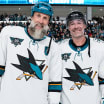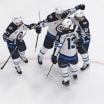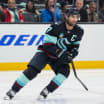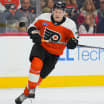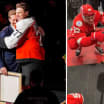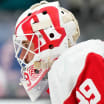NHL.com's Q&A feature called "Five Questions With …" runs each Tuesday throughout the 2017-18 regular season. We talk to key figures in the game and ask them questions to gain insight into their lives, careers and the most recent news.
The latest edition features Edmonton Oilers left wing and alternate captain Milan Lucic, who won the Stanley Cup with the Boston Bruins in 2011:
Five Questions with Milan Lucic
Oilers alternate captain discusses winning Stanley Cup with Bruins in 2011, playing with McDavid
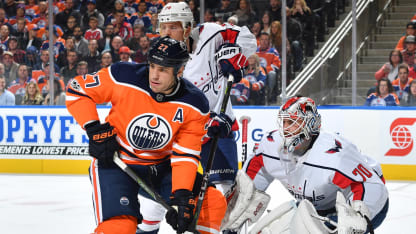
© Andy Devlin/Getty Images
EDMONTON --It was one of the biggest splashes when the free agent market opened July 1, 2016, and left wing Milan Lucic signed a seven-year, $42 million contract ($6 million average annual value) with the Edmonton Oilers.
The 29-year-old from Vancouver gave the Oilers a boost with 50 points (23 goals, 27 assists) in 2016-17, and they qualified for the Stanley Cup Playoffs for the first time since 2006.
Beyond the production, Lucic's veteran presence helped the Oilers to 103 points (47-26-9), an improvement of 33 points after their last-place finish in the Western Conference in 2015-16. Edmonton was second in the Pacific Divison and reached the Western Conference Second Round before losing in Game 7 to the Anaheim Ducks.
However, things haven't been quite as easy for Lucic or the Oilers this season.
The 50th pick in the 2006 NHL Draft has 19 points (five goals, 14 points) in 27 games, and Edmonton is 11-14-2 after winning three of its past four games.
"I think we're starting to play like we did last year," said Lucic, who has 466 points (187 goals, 279 assists) in 756 games with the Oilers, Boston Bruins and Los Angeles Kings. "I think last year we had a bit of a chip of our shoulder to prove a lot of people wrong and to make a change.
"I know for a lot of guys who had been here a while, they wanted to experience what playoff hockey was all about, so I think a lot of guys raised their level of play. And most of all, the team game we were able to play last year gave us the success we had."
The Oilers host the Philadelphia Flyers at Rogers Place on Wednesday (9:30 p.m. ET; SN1, NBCSP, NHL.TV).
"Winning four of our last six here, we're definitely trending in the right direction and we need to keep that going because we know what we're capable of," Lucic said. "We showed it last year if we play the right way."
Here are Five Questions with … Milan Lucic:
How will history remember the 2011 Stanley Cup-winning Bruins?
"I think history will remember that our team was down 2-0 and then 3-2 in the series and we always fought our way back. I think if you look at the last 10 years, that was probably the most hatred in a Final, at least the last 10 years. I think we fit the mold a big, bad Bruins team that was able to mix the big and the bad with the skillset. Me and David Krejci led the team with 62 points each that year, so we didn't have a prolific scorer, but we were the best team. And what Tim Thomas did speaks for itself. I think those are the things that history will remember about that Cup team."
You lived in the United States for some time and now you're back in a Canadian market. How has your move to Edmonton gone?
"It's definitely been different. Being in the U.S. for nine years, Boston and then a year in L.A., well, nothing compares to L.A. The guys live in Manhattan Beach or Hermosa Beach and the practice rink is in El Segundo, so you're living at or near the beach. Nothing compares to that in the League. And then Boston is one of those cities that's all history, brick and all of that, and there's lots to do. Coming back to Canada, especially to Edmonton, it was an adjustment, especially at the start. It was getting used to the coldness. And more than the coldness, getting used to the dryness. My skin and chapped lips, those were serious problems for me last year. I developed a bit of a skin problem, being in a dry climate like this because I grew up in Vancouver. I've always lived near the ocean. So that's been different. But family-wise, this has been great. The kids love the snow, being out in the snow, building snowmen. And getting adjusted to the community, that's been great, too. It's a lot smaller town than the two previous places I've played but the community is tight-knit and so is the city and that's what's made the adjustment a little easier."
When you signed with the Oilers, they put you in a stall in the locker room right next to Connor McDavid. What's that been like; what's Connor like?
"It's been great. Obviously he's still very young and still learning, even though he's already been an MVP in this League. I think he's still learning, especially in the season we're going through now and the challenges that come with every season and new year. Being beside a talent like that is pretty special and awesome. I'm in Year 11 and I'm still learning from a guy who last year was in Year 2. It's seeing his competitiveness and what he brings to the game and how much he loves the game and how much he wants to get better, even though you don't see a lot of areas where he can improve. You think you've seen it all and then he does something else, and you go, 'Oh my god, how did he pull that off?' Just being around him and Leon (Draisaitl), seeing what they can bring to the team and the level they can take a team to is pretty awesome to be a part of and I think it's pretty motivating, too."
You cited the 2010-11 Bruins' scoring stats. You're known to have an encyclopedic hockey memory. How did that get started?
"I'm just a student of the game, love the game. Even when I was in school, I was always good with numbers and math. Whenever I'm interested in something, I tend to remember things on point. That's been my life. I think it's a good thing to be invested in something that you love and something that you do, like we do. It's something that's natural for me. I think actually there are a lot of guys around the League like that but I'd say I'm a little more vocal about it than most guys."
Around the time you won the Cup, in that time frame five to 10 years ago, people frequently talked about power forwards, ranking them, identifying them and so on. You were and are in those conversations. Now, the most frequent talk seems to be about how fast the game is getting. How have you, as a power forward, made adjustments to keep up with this trend and the ever-evolving NHL?
"I think that's right, that it's about sticking with the trend. The one thing you don't want to lose is falling behind the game or the speed of the game. I think there is still a point to bringing that power, especially on the forecheck and going hard to the net, that type of stuff, so there is still that power-forward mentality that can be brought to a team and the game. But you definitely have to be on your toes now more than not. And it's not just the forwards getting faster. I think if you look around the League, the D-men are more mobile so catching up to the 'D', especially on the forecheck, those are the challenges that have come with the power-forward game. I'm just doing everything I can, especially playing with a guy like Connor, to keep up with the pace and speed of the game. I feel like I've done a pretty good job of that."


